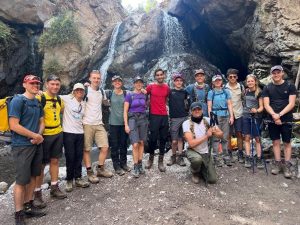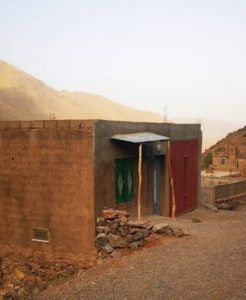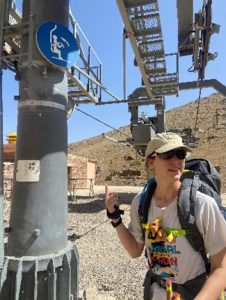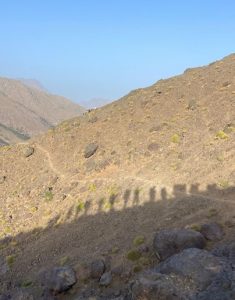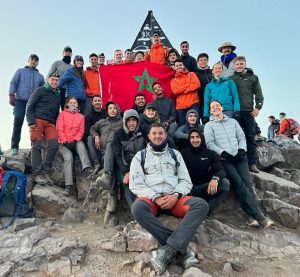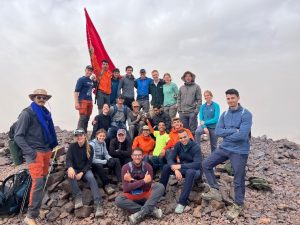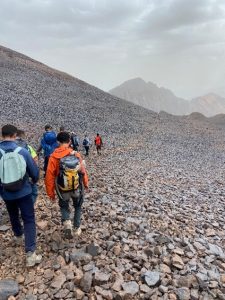In late August, 12 members from the Bristol and Northumbrian University Air Squadrons took part in a high altitude 2-week trekking expedition in the Moroccan High Altas Mountains with the “1ER Batallion de Chasseurs de L’Altlas Force Armees Royales”.
The aim of the expedition was to expose us to a challenging and unfamiliar environment where we would learn and develop endurance, courage, teamwork, leadership and communication skills. All these skills were put to the test immediately during such a long day of travelling but eventually after an incredible dinner from our hosts at the hotel, beds hit pillows to rest up for the first day of walking.
Acclimatisation. As expected, this start after being up for 36 hours was ambitious. A predictable dynamic occurred that morning as it was the first time the whole team was together, and communication was a barrier between the squadron and the Moroccan Military but lukily a student was able to communicate in French. A short walk was accomplished to the local waterfalls, returning by midday to give us the best chances of avoiding the 30-degree temperatures and would be a trend for the rest of the expedition. Upon returning we quickly washed sweat-soaked clothes and set out to explore Imlil. An awkward exchange with our police escort confirmed we were to be trailed by armed officers every moment we were out of our hotel, certainly a new experience for most of us. This format would be copied the next day, but a team discussion that evening set out a plan to change the dynamic. We would be moving at the exact time we had given the Moroccan’s and be set-up to lead in 3 distinct teams throughout the day, displaying our true qualities and skills to the Moroccan Military. Next up was the latter part of phase 1 on 12 Aug.
Trekking longer distances carrying all the equipment required to stay overnight and camp where needed was a step-up, with the change felt dramatically by all after a 1000m climb first thing. High spirits and confident leadership meant 11km went by smoothly before a final hour’s slog into Tacchedirt as legs wore weak and the sun belted down on necks. Upon reaching the refuge, we were treated to very reasonable accommodation considering it was a place, until recently, only reachable by foot. Here continued again one of the larger tasks of the trip, food. Having carried local produce bought from Imlil in our packs it was unloaded into the basic kitchen and team 2 took to producing dinner for 14 out of it. What we got produced in front of us 2 hours later was what can only be described as a success of curried chickpeas and couscous. The same can’t be said for the lunch where it was discovered the 14 enormous plastic-wrapped sausages we’d hiked with for a day were supposed have been stored in a fridge for their shelf and transit life. The following day after spending most of our allowance for a hearty breakfast very few had the stomach for, it was another half-day trek to Oukaimeden.
A spectacular climb that morning on the 13 Aug led us past the very reason we had elected to carry our supplies to Tacchedirt. The village store was impressively small and not particularly well stocked, a good laugh was had as we walked by. 1000m of ascent later through a mountain pass we walked into the town of Oukaimeden. Passing the ski lifts, they looked out of place in what was essentially a desert. By this time our Moroccan friends had settled in with the dynamic and had been engaging with us, although there was very much a sense that the women amongst our team weren’t being spoken to nearly as much, a striking cultural difference that would develop over the course of the exercise. Although it had been agreed to camp out that night, we struggled to find a good spot with shade and temperatures were forecasted to be very high the next day. This resulted the team to find accommodation within the budget.
After a much-needed rest day with a birthday kindly provided for by the Moroccan Military sourcing an incredible mousse cake in the middle of the mountains, it was up early for the longest day yet.
A new challenge of night navigation was explored that morning as we winded through tracks and made shortcuts through switchbacks. A long and hot day of 16km trailed by 8 dogs took us along our most technical section yet back into Imlil, where Brahim from the hotel and his hospitality waited eagerly. There was no time to relax though, as our most vertical day yet lay ahead.
A confident and drilled start by all the team put us on a solid pace to make it to Les Mouflons Refuge, Mt. Jebel Toubkal base camp. Over 1400m of ascent that morning put our legs to work, but with frequent breaks to rest out of the sun and let mules pass, we were in and setting up camp by 1200. On a levelled patch outside the refuge all the tents were pitched unbroken after an excited and hurried assembly. Faced with the prospect that Toubkal was in our sights and there was a rest day to be had, the atmosphere was positive and the team by this point reaching the norming stages. On the 18th August was to begin our Toubkal ascent.
The Toubkal climb was a particular challenge. A combination of darkness, lack of breakfast and slightly elevated emotions produced a brisk pace up a near 50% gradient. Fuelled by the Moroccan military encouraging our pace to make it up for sunrise, we stormed to the top to find the most incredible sunrise over a hazy mountain range, of which we were stood right at the top of, putting us as the highest in North Africa. 4167m. For the first time for most of the team, we could feel a major change in breathing and fitness. An hour later, came the descent. What should have been straight forward filled with success turned into an individual and task-focused affair to get down the mountain. Some tough lessons were learnt by the time all had reached the bottom, summed up in another team briefing but that by this point had become constructive.
The following days included difficult decisions of how to modify the route so it was within the capabilities of everyone in the team at that time. 19th August was a rest day and then 20th and 21st August were spent climbing the 2nd and 3rd highest peaks, and then up to Tibherine East exploring the crash site of an L-749 Constellation. Seeing the tomb of those that unfortunately lost their lives in the 1969 crash made quite an impact for the rest of the walk back to the refuge.
Our final day of walking came around as a descent back to Imlil. This time a real sense of achievement emanating from everyone on the team. Brahim’s hotel filled us with incredible fragrances of sweet tea as we arrived and indulged in a civilised cup of tea, a fine end to phase 2 and the walking of our expedition. What followed was an afternoon and evening in Marrakech the following day. Marrakech was a hectic and energetic end to an incredible trip, with our security forces and the battalion officer accompanying us up to the last moment in the airport. An incredible effort by everyone in the team, those that assisted in the planning and our Moroccan counter-parts.
Officer Cadet Henry Bretz, who took part in the expedition said,
“Going to Morocco with the squadron was one of the best things I have done in my university career. The expedition exposed us to a challenging and unfamiliar environment where we were placed in a position to develop endurance, courage, team-work, leadership and communication skills. I feel that I really had an opportunity to expand my skillset in a way that I wouldn’t be able to outside of an expedition and I’d like to extend my greatest thanks to the Ulysses Trust for making it possible.”

